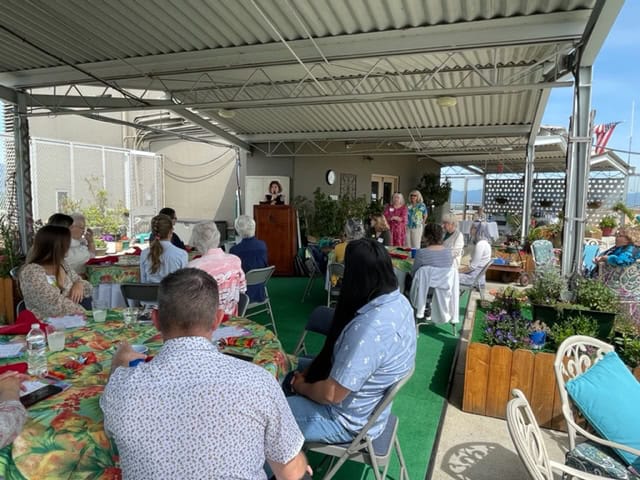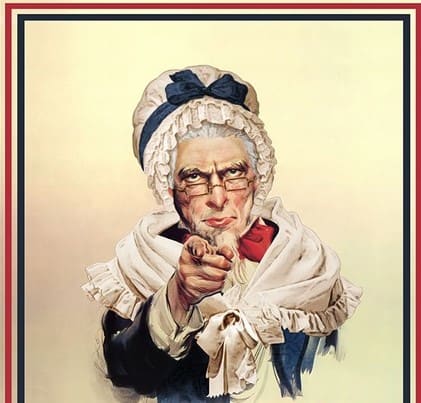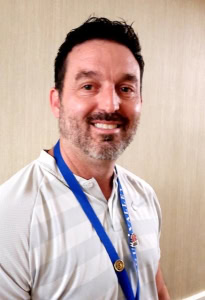Taking on Hospice, One Step at a Time
By Joni Johnson
When we arrived at RVM in April 2019, my husband was just beginning to show signs of the Interstitial lung disease that had dogged him during the last three years. And with each month he progressively got worse. The last six months of his life got more and more difficult. I never had to take on the traditional role of caregiver, but basically I took on the role of delivering things because he couldn’t get them any more, and being there for him more and more both emotionally and physically. We were lucky in that we were able to talk about his dying and what he wanted and needed. But it was very hard to watch him diminish physically with each passing week.
 He was on Palliative care for much of the time we were here. That meant that he had a weekly visit by a nurse, and earlier in our stay was able to get home physical therapy. Palliative care is available for those patients who are still seeking treatment but need outside extra support. According to cancer.net, the care can include prevention, early identification, comprehensive assessment, and management of physical issues, including pain and other distressing symptoms, psychological distress, spiritual distress, and social needs. Whenever possible, these interventions must be evidence based. Palliative Care was prescribed by Tom’s pulmonologist. Tom’s connection to his nurse, who came every week to check up on him and give support, was wonderful for him, especially as he became more incapacitated.
He was on Palliative care for much of the time we were here. That meant that he had a weekly visit by a nurse, and earlier in our stay was able to get home physical therapy. Palliative care is available for those patients who are still seeking treatment but need outside extra support. According to cancer.net, the care can include prevention, early identification, comprehensive assessment, and management of physical issues, including pain and other distressing symptoms, psychological distress, spiritual distress, and social needs. Whenever possible, these interventions must be evidence based. Palliative Care was prescribed by Tom’s pulmonologist. Tom’s connection to his nurse, who came every week to check up on him and give support, was wonderful for him, especially as he became more incapacitated.
About three months before his death, I was attending a party in Ashland when I suddenly got a call from someone who said that she was a Hospice nurse and the “palliative care team” had recommended that she call and let us know what Hospice was all about. It freaked me out. I was not as kind to her on the phone as I could have been. Hospice to me meant that death was imminent, and while I mentally knew that we were heading in that direction, I was not prepared for it emotionally. However, I did promise that I would talk to Tom, and if he were interested, we could set up an appointment. I was expecting Tom to balk at the suggestion and was rather surprised that he thought it was a good idea.
 When Nancy Heyerman, The Hospice nurse, came to visit, she explained to us the difference between Hospice and Palliative care. Basically, Palliative Care provides relief from the symptoms and stress of for people with a termal diagnosis regardless of their prognosis. The goal is to improve quality of life for both the patient and the family as treatment continues. Care begins after diagnosis and during treatment. On the other hand, Hospice is for those who have decided that treatment is no longer beneficial, and the main goal is to provide as much comfort care as possible. It is specifically end of life care when the patient has less than 6 months to live. Under Hospice, the person must give up all of their treatments, which include specialists. A tremendous amount of medical support is available from the Hospice team, but none of it can be curative. As Nancy said to me, “Statistically we know that patients who are on hospice live longer and more comfortably. Generally it is not ‘curative’, however patients often recover to a ‘non-terminal’ condition although their disease may still be present and we then discharge them from hospice care.”
When Nancy Heyerman, The Hospice nurse, came to visit, she explained to us the difference between Hospice and Palliative care. Basically, Palliative Care provides relief from the symptoms and stress of for people with a termal diagnosis regardless of their prognosis. The goal is to improve quality of life for both the patient and the family as treatment continues. Care begins after diagnosis and during treatment. On the other hand, Hospice is for those who have decided that treatment is no longer beneficial, and the main goal is to provide as much comfort care as possible. It is specifically end of life care when the patient has less than 6 months to live. Under Hospice, the person must give up all of their treatments, which include specialists. A tremendous amount of medical support is available from the Hospice team, but none of it can be curative. As Nancy said to me, “Statistically we know that patients who are on hospice live longer and more comfortably. Generally it is not ‘curative’, however patients often recover to a ‘non-terminal’ condition although their disease may still be present and we then discharge them from hospice care.”
For us, it would include a lot of free medication delivered to our door as well as ongoing nursing support and a Hospice physician for prescriptions and other advice. We would be allowed to choose the one doctor we wanted to stay with, but Medicare would no longer pay for any visits to other physicians or any treatments or blood tests. They would provide a hospital bed and some care options like help with showers and pedicures. They also provide religious support through a chaplaincy service. But we did not want to give up going to the pulmonologists nor give up the blood tests that let us know that his kidneys were doing fine in spite of the very heavy doses of diuretics. So we politely declined.
As Tom’s condition worsened, I kept asking how long he had to live and how would his death manifest itself. I spoke with the palliative and hospice nurses and also with Tom’s pulmonologist. In the end, his pulmonologist recommended that he consider “death with dignity” as a last resort. She confirmed that he could die from heart failure, which would be easier, but if not, the disease progression could be very difficult and he might want another option rather than to go through it all. We did start all of the preparations for “death with dignity”. Luckily, our primary care physician was willing to consider it. And we asked the pulmonologist to be the second doctor. Then it required paperwork plus two conversations with the doctor at least fifteen days apart that convinced him that this was a decision that Tom was making on his own.
The Hospice nurse again called us to find out if we wanted to meet with her. Again, this call out of the blue was very disconcerting. We were not ready. We knew what it meant and we did not want to give up our options.
In the mean time, Tom’s condition was deteriorating more rapidly. Two weeks before we had absolutely declined hospice service. Suddenly, now, on a Sunday, we decided that we were ready. We realized that there wasn’t much that could be done for Tom and his disease. Now we wanted Hospice help.

What a wise decision. Tom was home and never needed real care. I had hired a person to come once a week from Care Team to give him whatever help he needed plus extra help for me. We had long term care with a 90-day waiting period once the claim was made. However, under Hospice, our long-term care company (CalPers) waived the 90-day period and started paying for our Care Team help, retroactively. Nancy, from Hospice, appeared on our doorstep on Tuesday, and by Wednesday the contract was signed and that night we had a knock on the door with small doses of liquid morphine, Oxycodone and all sorts of other medication. We had access to Nancy by phone and text. We had access to 24 hour support through their telephone number which was invaluable. Tom got his pedicure and we had a wonderful talk with the chaplain even though Tom was a died-in-the-wool atheist. There was support for me if I needed it. Luckily, I had been seeing Linda Bellinson for quite a while, so I had my own support already in the works. So for the three + weeks before his death, we got the amazing treatment and support that Hospice provided. It was quite wonderful. Even the morphine was helpful on occasion to help his breathing. Tom was lucky in that he was never in pain. If he had been, the medical support would have been even more amazing. And luckily, his death came very quickly and easily. I am not even sure we knew he was actually dying until the last few hours.
Am I sorry that we didn’t go to Hospice sooner? We weren’t ready. But, it was wonderful to have that amazing service at our doorstep. And after Tom’s death, they were still providing support. I could have had individual counseling. Covid messed up their groups but that is in the works for the future. People called to make sure I was ok. Another benefit, if you are under Hospice care, when your loved one passes, Hospice calls the funeral home and therefore an ambulance or firetruck does not appear at your doorstep. Tom was picked up in a large SUV. No markings. When people say that Hospice is wonderful, they are right. If you have any questions, please feel free to call me at 6150. I can’t say enough about their help and support.







 She fell back tactically, but continued to hammer away on the strategic point of having emergency notification capability readily at hand. Which I admit is not a bad idea, even if it did start off as somebody else’s. So I made conciliatory noises, and when she left, swung into action.
She fell back tactically, but continued to hammer away on the strategic point of having emergency notification capability readily at hand. Which I admit is not a bad idea, even if it did start off as somebody else’s. So I made conciliatory noises, and when she left, swung into action. PS-1: The Revenge of the Pendant – Rick told me to just throw my original necklace pendant in the trash when I found it. I did, on Monday, and early Tuesday morning got a call from Jens Larsen about an emergency signal from my cottage. No explanation, until I realized that this was about the time when the garbage truck was compacting the trash in my area. A technological death rattle.
PS-1: The Revenge of the Pendant – Rick told me to just throw my original necklace pendant in the trash when I found it. I did, on Monday, and early Tuesday morning got a call from Jens Larsen about an emergency signal from my cottage. No explanation, until I realized that this was about the time when the garbage truck was compacting the trash in my area. A technological death rattle.


